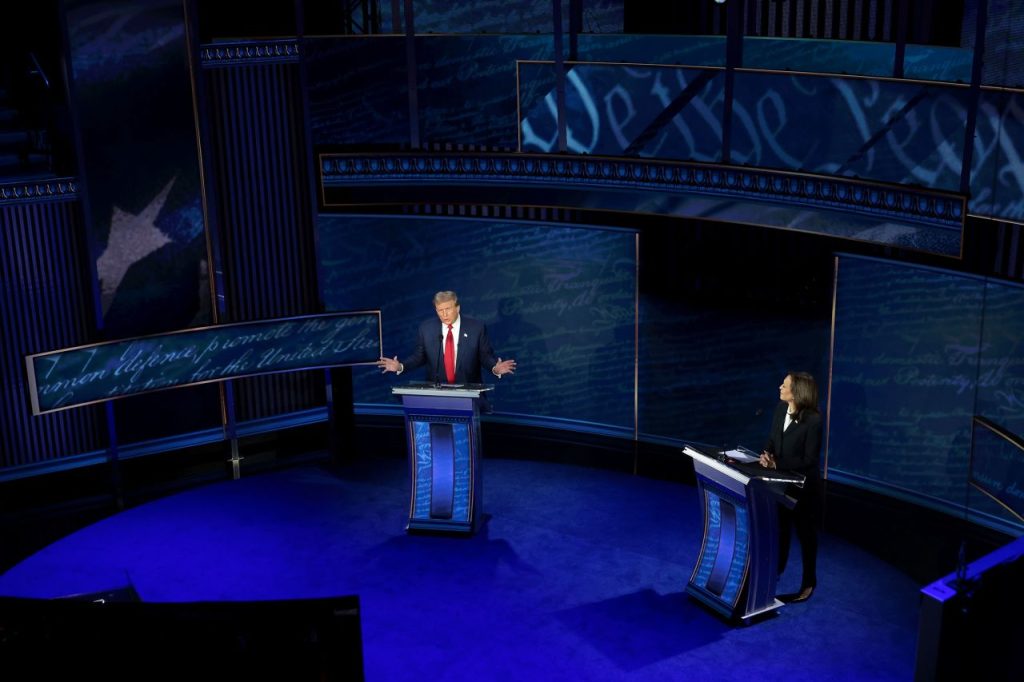Who won the Harris-Trump presidential debate?
3 min read

In a highly anticipated showdown, Donald Trump and Kamala Harris faced off for the first time on the presidential debate stage in Philadelphia on Tuesday night. The encounter proved to be a heated and contentious exchange, with Harris emerging as the dominant force in the debate.
From the outset, Harris targeted Trump with sharp personal attacks that unsettled the former president and disrupted his messaging. Her critiques ranged from mocking the size of his rally crowds to questioning his conduct during the Capitol riot. These jabs effectively threw Trump off balance and set the tone for the debate.
Harris’s strategy seemed clear: she aimed to provoke Trump into extended defenses of his past actions and statements. Her comments about Trump’s rally sizes, for instance, were pointed. She suggested that Trump’s rallies were so lackluster that attendees often left early due to boredom. This remark visibly irritated Trump, leading him to divert much of his response to defending his rally numbers rather than addressing the broader issue at hand.
The debate’s flow often had Harris pushing Trump into uncomfortable positions. For example, when discussing immigration, Trump veered into an unsubstantiated claim about Haitian immigrants allegedly abducting pets, a topic that distracted from the more pertinent discussion about immigration policies.
The debate’s dynamics heavily favored Harris in terms of utilizing her strengths and highlighting Trump’s weaknesses. Early on, the conversation shifted to economic issues and abortion—areas where Harris made significant headway. While public sentiment indicates dissatisfaction with the Biden administration’s handling of inflation and the economy, Harris skillfully pivoted the conversation to critique Trump’s economic policies.
She branded Trump’s proposed tariffs as a “Trump sales tax” and highlighted Project 2025, a controversial conservative plan for a potential future Republican administration. Although Trump tried to distance himself from Project 2025 and defended his tariff policy, his responses failed to effectively challenge Harris on economic issues, leaving him on the defensive.
When the topic turned to abortion, Trump struggled to articulate a coherent position. He claimed that overturning Roe v. Wade was broadly supported, a view not supported by polling data. His response was often disjointed and failed to resonate.
Conversely, Harris delivered a compelling and personal argument, addressing the struggles of families affected by severe pregnancy complications in states with abortion bans—“Trump abortion bans,” as she called them. Her message was poignant and effectively highlighted a significant area where she has a clear advantage over Trump.
Throughout the debate, Harris repeatedly succeeded in putting Trump on the defensive. She prodded him about his past positions and even managed to make him address his father’s financial support—a topic Trump clearly found uncomfortable. On issues like the Afghanistan withdrawal, Harris redirected the conversation to Trump’s own controversial dealings with the Taliban, a tactic that repeatedly forced Trump to defend his record rather than press his attacks.
The debate also saw criticism from Republicans who accused moderators David Muir and Linsey Davis of bias in favor of Harris. The moderators did push back and fact-check several of Trump’s statements, but it was Trump’s own responses and his susceptibility to Harris’s provocations that defined the evening.
The debate’s impact was evident in the candidates’ demeanor. Harris appeared bemused or incredulous when Trump spoke, while Trump’s demeanor was often scowling and defensive. The contrast in their responses underscored Harris’s effective debate strategy.
Following the debate, the Harris campaign was quick to call for a second debate before November, signaling their confidence in the performance. This prompt call for another debate suggests the Democrats believe Harris performed exceptionally well.
In conclusion, Tuesday night’s debate showcased Harris’s skillful handling of the stage and her ability to keep Trump on the back foot. The former president’s struggles to effectively counter Harris’s attacks and his tendency to take the bait were central to the debate’s narrative, giving Harris a clear edge in this critical encounter.